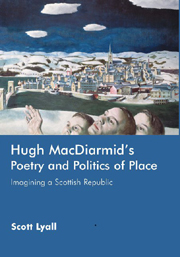Book contents
- Frontmatter
- Contents
- Dedication
- Acknowledgements
- Abbreviations of Works by Hugh MacDiarmid
- A Note on the Text
- Map
- Introduction: Imagining a Scottish Republic
- 1 ‘Towards a New Scotland’: Selfhood, History and the Scottish Renaissance
- 2 Debatable Land
- 3 ‘A Disgrace to the Community’
- 4 At the Edge of the World
- 5 ‘Ootward Boond Frae Scotland’: MacDiarmid, Modernism and the Masses
- Index
4 - At the Edge of the World
Published online by Cambridge University Press: 12 September 2012
- Frontmatter
- Contents
- Dedication
- Acknowledgements
- Abbreviations of Works by Hugh MacDiarmid
- A Note on the Text
- Map
- Introduction: Imagining a Scottish Republic
- 1 ‘Towards a New Scotland’: Selfhood, History and the Scottish Renaissance
- 2 Debatable Land
- 3 ‘A Disgrace to the Community’
- 4 At the Edge of the World
- 5 ‘Ootward Boond Frae Scotland’: MacDiarmid, Modernism and the Masses
- Index
Summary
Leaving Leith on Tuesday, 2 May 1933 on the St Magnus bound for Shetland, MacDiarmid was sailing against the tide of urbanised modernity. Only three years previously, on 29 August 1930, the HMS Harebell carried the last people from Hirta, the main island of St Kilda, most westerly of the Hebrides. Refused permission to film on St Kilda by owner Lord Dumfries, director Michael Powell headed for Foula off the west coast of mainland Shetland. After a seven-year ordeal of frustrated planning and four gruelling months of filming, The Edge of the World, Powell's dramatisation of the evacuation of St Kilda, was finally released in 1937. Blending an almost mystical romanticism with a realist's grasp of the importance of location, Powell's experimental film movingly marks the tragedies of depopulation in all of Scotland's island groups.
Calling the St Kildan evacuation ‘a very curious matter’, MacDiarmid's ‘The Modern Scene’ (1934) pushes beyond Powell's film to question the political purpose of peripheral clearances:
St Kilda, as Professor Mathieson has shown, is perhaps the most fertile island in the whole of Europe and, given proper methods, could feed all Glasgow, while it could also have been the centre of a prosperous fine wool industry. It is not impossible that its otherwise incomprehensible, and totally unnecessary and unjustifiable evacuation, is accounted for by reasons of ‘higher policy’ of which the public knows nothing and even the Press only enough to take the hint and say nothing.
(SS, 40)- Type
- Chapter
- Information
- Hugh MacDiarmid's Poetry and Politics of PlaceImagining a Scottish Republic, pp. 116 - 150Publisher: Edinburgh University PressPrint publication year: 2006



